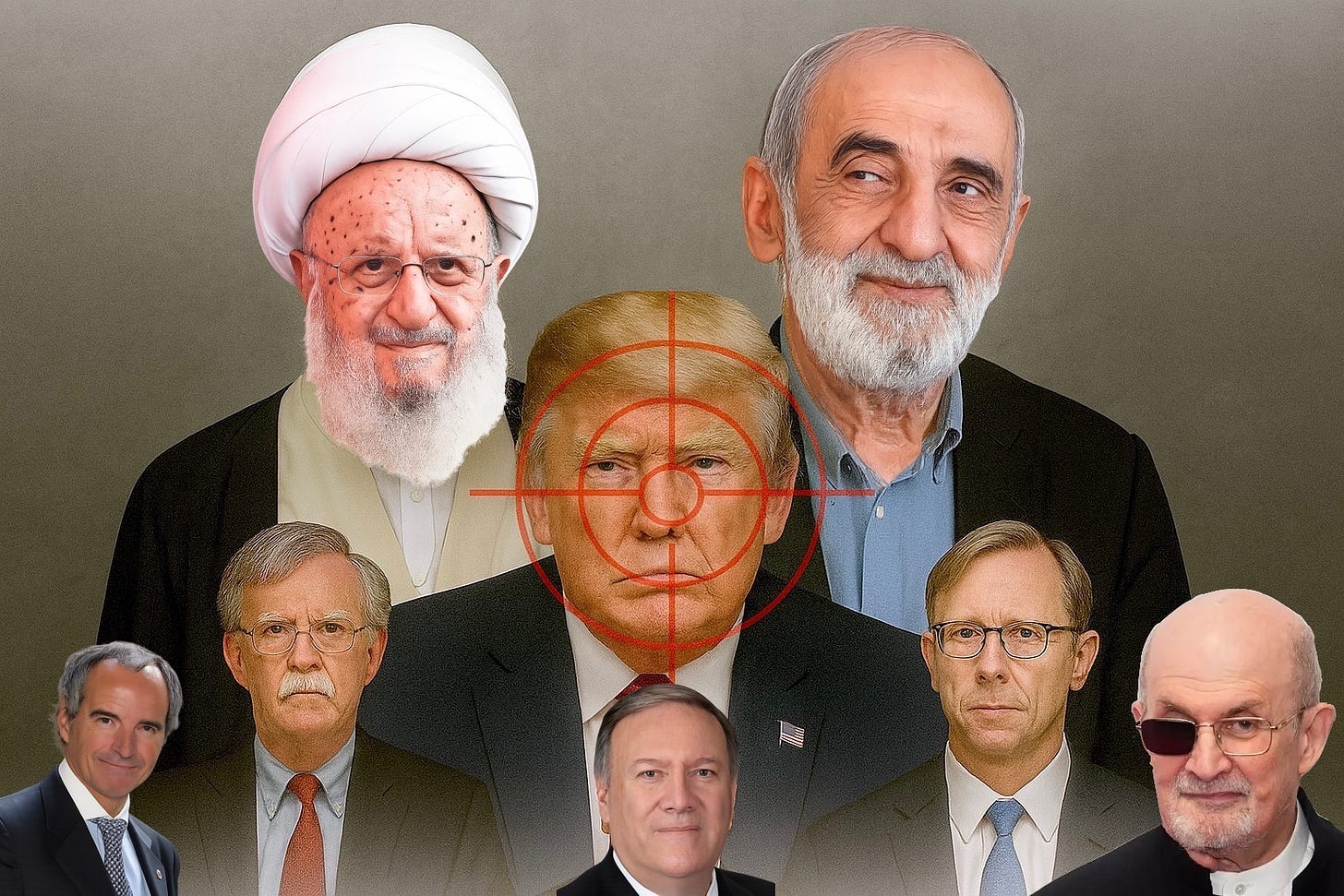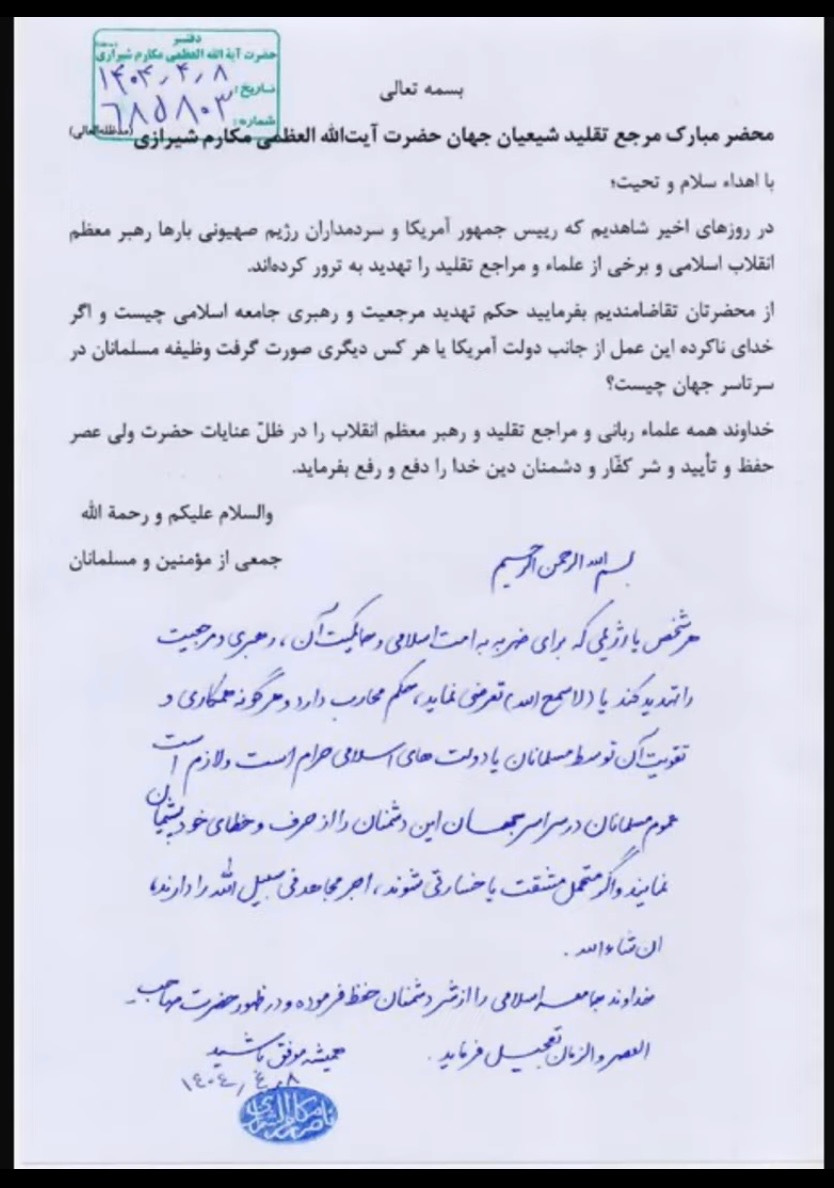Open Season on Trump et al
How the Khomeinist Regime’s Fatwas Sanction Global Vigilantism and Political Assassinations
In a grim fusion of theology and terrorism, Ayatollah Naser Makarem Shirazi—one of the most senior clerics in the Khomeinist regime—has issued a fatwa, a sweeping religious decree calling for retaliation against anyone who threatens the regime’s ruling elite. Framed as a fatwa but functioning as a license to kill, it explicitly sanctions global violence in defense of Tehran's leadership—namely, Ali Khamenei.
The fatwa, dated June 28, 2025, reads:
In the Name of God, the Most Compassionate, the Most Merciful
“Any person or regime that, in an effort to strike at the Islamic ummah and its sovereignty, threatens or (God forbid) attacks the leadership or the Marja'iyyat (religious authority) is considered a mohareb (one who wages war against God). Any form of cooperation or support for such persons or regimes by Muslims or Islamic governments is haram (forbidden). All Muslims around the world must take action to make these enemies regret their words and deeds. If they endure hardship or loss in doing so, they shall receive the reward of a mujahid fi sabilillah (fighter in the path of God), God willing.
May God protect all the religious scholars, religious authorities & Islamic sources of emanations, and the Supreme Leader of the Revolution under the protection of the Guardian of the Age (The 12th Imam, Mohammad Al Mahdi) from the evils of its enemies and hasten the reappearance of the Master of the Age [Imam Mahdi].
Always be victorious.
Dated 1404/4/8 (Lunar calendar, equal to June 28, 2025)
This argument is not religious theory. It is a theological-cum-mafiaistic justification for political murder—and its implications are both immediate and global. U.S. President Donald Trump and Israeli Prime Minister Benjamin Netanyahu are clearly intended targets. The fatwa builds on months of violent incitement from Tehran’s media and political operatives, most notably Kayhan editor-in-chief Hossein Shariatmadari, who has repeatedly called for Trump’s assassination in response to the 2020 killing of Qassem Soleimani and now the so-called 12 day war.
Shariatmadari, as the direct mouthpiece of Ali Khamenei, has gone so far as to brand Trump a “war criminal” and “enemy of Islam,” whose elimination is not only permissible but necessary. These calls have not remained rhetorical.
The Islamic Republic made several serious attempts to assassinate Trump during his 2024 presidential campaign. The plot was far more advanced than previously disclosed. As a result, Trump’s security detail had to carry out multiple deception operations to evade Iranian operatives. This was not posturing—it was attempted murder.
Now, the clerical regime is formalizing the theology to match its terrorism.
While the world focuses on diplomatic process and nuclear negotiations, Tehran’s internal messaging has shifted entirely to one of militant vengeance. Mojtaba Zonnour, Vice Speaker of Parliament, recently declared that Rafael Grossi, the head of the International Atomic Energy Agency (IAEA), would no longer be permitted to inspect Iran’s nuclear facilities. This defiance was quickly escalated by Kayhan, which wrote:
“They should have said outright that Grossi is a known Mossad spy and will never be allowed into Iran. Dozens of documents prove he’s spied for the Zionist regime. He should be publicly warned that if he attempts to enter Iran, he will be immediately arrested, tried and executed for espionage and complicity in the murder of our people.”
This is the same regime that now feigns outrage when Donald Trump refers to Khamenei as a “vicious dictator.” On June 28, Al Arabiya reported Iran’s official condemnation of Trump’s comments as “disrespectful and unacceptable.” But what respect does a regime that threatens to execute UN inspectors and assassinate former heads of state deserve?
The Islamic Republic has long practiced assassination abroad—from the 1989 fatwa against Salman Rushdie, which finally came to pass in 2022, nearly 33 years after its issuance, to the murders of dissidents in Europe to recent foiled plots targeting former U.S. officials like John Bolton and Mike Pompeo. The latest fatwa from Makarem Shirazi is not a fringe opinion. It is a state-aligned order backed by the regime’s most powerful institutions—delivered with the intent of providing “spiritual cover” for an international campaign of murder.
Makarem Shirazi and Shariatmadari have different uniforms—a turban and a suit—but they both want to eliminate the regime's enemies. They don’t just justify terrorism; they sanctify it.
The Islamic regime in Tehran is not just a diplomatic challenge. It is a transnational assassination network blessed from the pulpit. If the West continues to ignore these threats, or worse, accommodate them through appeasement and negotiations, it will be complicit in its destabilization.






